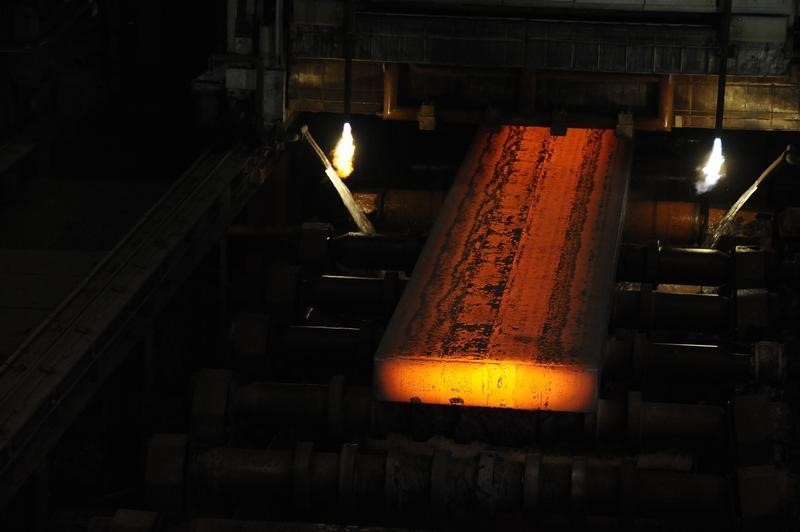* Metals and agriculture products fall
* Supply glut and possible U.S. rate hike dent sentiment
* Steel and iron ore futures fall more than 2 percent (Updates close prices, adds BHP comment)
By Ruby Lian and David Stanway
SHANGHAI, May 19 (Reuters) - Chinese iron ore and steel futures stretched losses on Thursday, with selling also spilling into other raw materials, amid caution over a supply glut for some industrial metals and a possible U.S. rate hike.
Some traders are concerned that China's own monetary easing cycle could be over, limiting the prospects for the world's No. 2 economy and raising concerns over demand for commodities.
Chinese iron ore futures tumbled more than 4 percent and steel futures dropped by over 3 percent during the session, as demand is also faltering seasonally. However, production by steel mills is still picking up because of rising prices earlier this year, worsening a supply glut that led to accusations China is dumping low-price steel onto global markets.
"The fundamentals for industrial metals haven't improved, and production for some metals including steel and aluminium is rising without enough demand support, so we are bearish in the medium term," said Wu Ren, research director of the investment department with Nanhua Futures in Hangzhou.
"The expectation of the U.S. rate hike and weakening oil prices also hit market confidence and drove down commodities."
BHP Billiton (LON:BLT) BHP.AX , the world's No.3 iron ore miner, said more than 50 million tonnes of steel capacity had been restarted in China since the start of the year. most-traded rebar futures contract on the Shanghai Futures Exchange SRBcv1 hit a session low of 2,024 yuan ($309.39) a tonne, ending the day down by 2.3 percent at 2,043 yuan.
Dalian iron ore futures DCIOcv1 dropped to a low of 363.5 yuan a tonne before closing 3.6 percent lower at 367 yuan a tonne. Both steel and iron ore futures have fallen about 27 percent from their April high.
Coke DCJcv1 also slide about 2 percent and coking coal DJMcv1 dropped half a percent by close.
The U.S. Federal Reserve indicated the U.S. economy could be ready for another rate increase next month, according to the minutes from the central bank's April policy meeting. Chinese commodity futures are typically priced in yuan, they trade in line with other commodity markets priced in U.S. dollars. Dollar-denominated commodity futures tend to fall when the greenback gains since it makes purchasing them more expensive for buyers paying with other currencies.
The slide has spread to other assets, with nickel SNIcv1 and zinc SZNcv1 down over 1 percent. Some agriculture products futures also fell, with soymeal DSMcv1 and egg DJDcv1 futures declining over 1 percent and beanoil DBYcv1 down 2.4 percent. ($1 = 6.5418 Chinese yuan renminbi)
